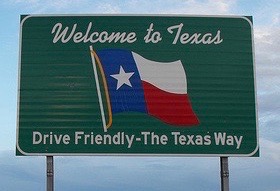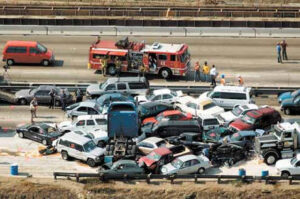When my husband was learning to drive, his dad would sit in the passenger’s seat repeating his mantra (an old family favorite): “Watch out for the other drivers on the road because they’re all trying to kill you.” We continued this tradition with our own kids and (mostly) we all took the lesson to heart.

Defensive driving became a way of life for our family.
So I’m thinking now would be a really good time to do some defensive living. To take some of the time honored practices of defensive driving as a way to live together in an age of deadly, disorienting pandemics.
#1. THEY’RE ALL TRYING TO KILL YOU
In other words, don’t trust the other person to do the right thing. The responsibility for our own health and safety is our own. Many people out there are trying to do the right thing during this pandemic: following the rules, observing the guidelines, acting with a respectful courtesy toward their fellow travelers.
But a small group is filled with a dangerous, selfish road rage. Besides them, there is a wider group that is just plain thoughtless and careless about their responsibilities in this our shared society. These folks may not be trying to kill us intentionally, but they are killing us anyway.
#2. MAINTAIN A SAFE DISTANCE
One car length for every ten miles an hour is the rule of thumb for defensive driving. Six feet is the new norm for defensive living. Both have scientific rationale and both save lives. Both are just good common sense.
#3. AVOID WOLF PACKS
You know those clumps of cars that cluster together on the highway and block other traffic from getting around them? Driving instructors call them “wolf packs” and caution all of us to slow down and stay away. Things happen fast in these kinds of situations and disastrous chain reactions can occur before we know what’s happening.

Letting ourselves get sucked into a pack is dangerous enough on a good driving day, given the high speeds of travel on a highway. But during a time when road conditions are compromised even further with rain, ice or fog, we set ourselves up for all sorts of problems.
During a time of living that is compromised and complicated by pandemic, putting ourselves in the middle of such a congregation with a lot of people we don’t know and can’t trust is a recipe for disaster. (See #1 and #2 above)
#4. KEEP THE BIG PICTURE
Even as we keep our eyes on the road ahead, we must also keep scanning our rear view mirrors. We still keep watching what’s happening at the intersections and the shoulders and the side roads. We stay alert without becoming distracted.
In this age of pandemic, now more than ever, those of us who are committed to defensive living need to stay focused on the big picture.
For me, the big picture is the recovery and well being of our world.
I see this pandemic as a roadblock: a massive global slow down with multiple obstacles creating dangerous conditions for too many of my fellow travelers.
I also see how this worldwide crisis has unveiled some harsh realities. On the one hand, well maintained express lanes are reserved for a privileged few while, on the other hand, crowded highways marked by gaping potholes, bottlenecks, narrow lanes and shallow shoulders serve the majority of people all across the globe. (All built with public monies, by the way.)
In this metaphor, I realize my defensive driving/defensive living tips mostly benefit those of us who are allowed to drive on those well-manicured thoroughfares. Those of us who can work from home, buy online and benefit from high speed internet. Countless other people are not so fortunate and I realize they have little ability to maintain safe distances and avoid the wolf packs.
Another deadly pandemic
Today as I write this, I am keenly aware of the recent murders of yet some more of our Black brothers and sisters by White cops and White supremacists. I am watching riotous rage erupt in several American cities.
And I ponder what it must be like for our Black family members who must practice – every minute of their lives – defensive living in the midst of our ongoing pandemic of racism.
I wonder what it would be like if #1 (above) was literal and actual for me. I can’t even imagine.
In my grief in these days, I’ve been reading the wisdom of some of my Black friends because their words are the words I need to hear right now.
One Baptist pastor, James Ellis III, wrote not long after the murder of Ahmaud Arbery. His essay is particularly for us “enlightened and well meaning Christians” but he also speaks to any who are accustomed to speeding blithely along on protected, well-tended highways.
Pastor Ellis is clear and direct, just as he is loving and pastoral.
White Christians, perhaps due in part to an obsessive and fast-paced culture of the privileged, have favored convenient, woeful forgetfulness.
Many choose to stick their heads in the sand altogether, opting to remain ill-informed about the past and present, in hopes of achieving an artificial peace. But there is a better way….
To be clear, I do not desire your tears, pity, lip service or guilt. Renunciation, however, is something else…
Right theology and right living, as defined in the Bible, is the fruit we all are called – and held accountable – to cultivate.
The two fold pandemics of coronavirus and racism have revealed the ongoing and stark inequities and injustices of our national big picture. Those of us who can catch even a glimpse of this sad reality must not lose that vision. We must not stick our heads in the sand and pine for the privileged comforts of our nation’s old normal.
Instead we must hold on to the discomfort of this disorienting chaos and find ways to construct a new orientation. Our world needs a New Normal and we must create it together.
James Ellis III | May 15, 2020 writing in The Baptist News
A lowdown, dirty shame: Ahmaud Arbery’s murder and the unrenounced racism of white Christians
“Chaos Does Not Have to Destroy Us” by historian Heather Cox Richardson.
Not heard of the “wolf pack” before. Will have my eyes open for it from now on.